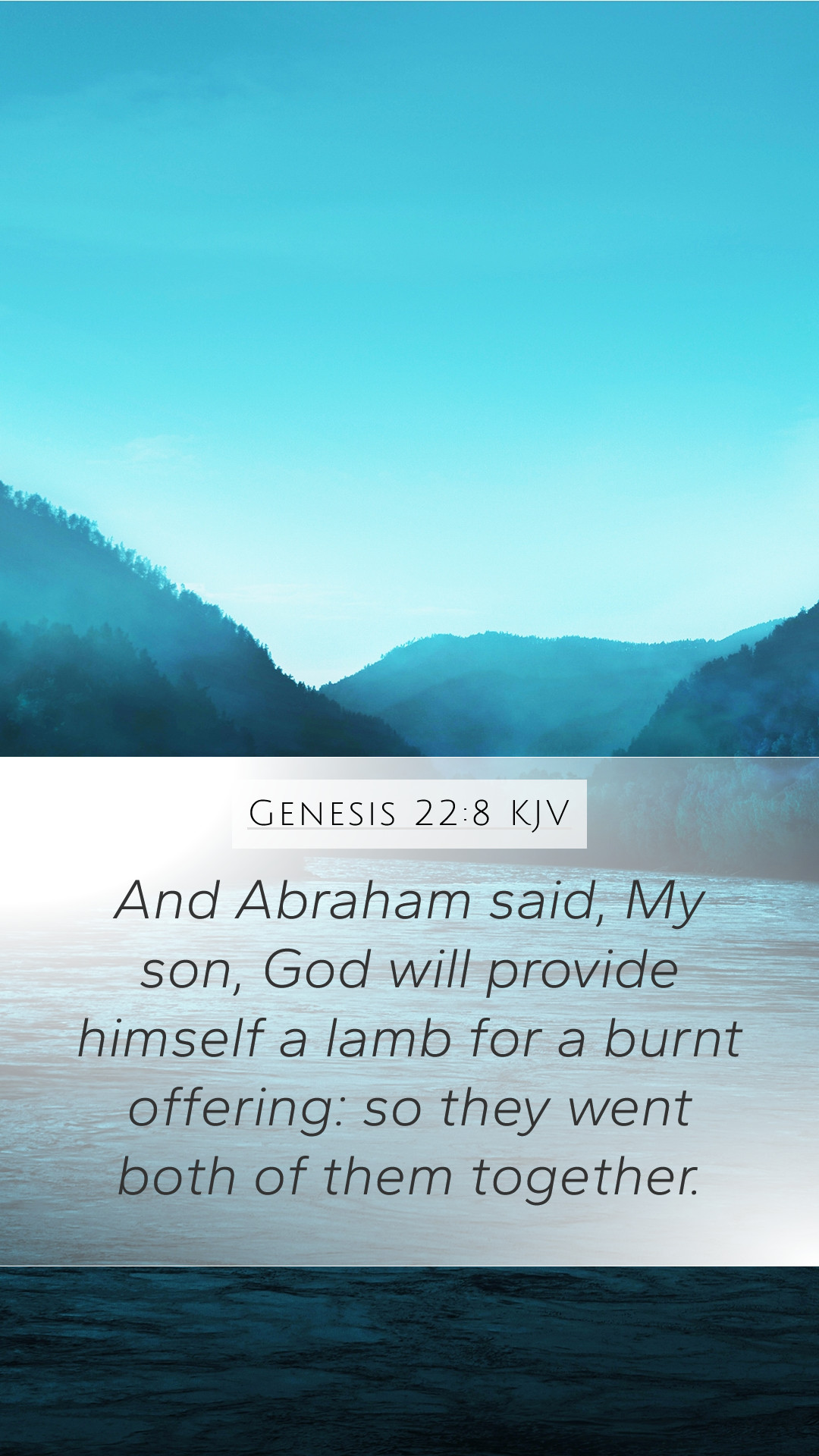Understanding Genesis 22:8
Genesis 22:8 states, "Abraham said, 'God will provide for himself the lamb for a burnt offering, my son.' So they went both of them together."
This verse is pivotal in the narrative of Abraham's faith and God's providence. Below is an exploration of its meaning and significance through respected public domain commentaries.
Bible Verse Meaning
In this passage, Abraham demonstrates profound faith and understanding of God's provision. Within the context of the sacrificial system of the Old Testament, Abraham's response is significant:
-
Matthew Henry's Commentary:
Henry emphasizes Abraham's unwavering faith in God. By stating that God will provide, Abraham confidently assures Isaac that God has a plan for their sacrifice, indicating his trust in God’s goodness and provision.
-
Albert Barnes' Notes:
Barnes notes that Abraham’s assertion points towards a future understanding of sacrifice. The phrase ‘God will provide’ hints at the coming of Christ, the true Lamb provided for the sin of humanity.
-
Adam Clarke's Commentary:
Clarke points out the meaning of ‘lamb’ in this context, which symbolizes innocence, and underscores the foreshadowing of the ultimate sacrifice of Jesus. This verse is not only a moment of faith but also a prophetic statement about redemption.
Bible Verse Interpretations
This verse is often discussed in the spheres of Bible study groups and online Bible study resources due to its rich theological implications.
The interpretations focus on themes of faith, obedience, and God's provision:
-
Understanding Faith:
Abraham’s willingness to follow God's command exemplifies the essence of faith—trusting in God's plan even when the path is unclear.
-
Divine Providence:
The assurance that God will provide explicitly connects to how believers understand God's provision in their lives today, encouraging them to live with confidence.
Scripture Analysis
Analyzing Genesis 22:8 in context allows for a deeper appreciation of its implications for both the Old and New Testaments.
Key aspects include:
-
Typology:
The story serves as a typological foreshadowing of Christ’s sacrifice, with Abraham as the father offering his son and God providing the ultimate Lamb.
-
Faith under Trial:
Abraham’s test parallels the trials believers face, suggesting that maintaining faith during difficult circumstances is vital for spiritual growth.
Biblical Exegesis
Performing an exegesis of this verse leads to a circle of theological understanding:
-
God’s requirement for sacrifice lays the groundwork for understanding the need for atonement.
-
Abraham's declaration serves both a personal assurance and a prophetic utterance, suggesting that his faith reflects the overarching narrative of salvation.
Bible Study Insights
For those looking to delve deeper into the meaning of Bible verses, Genesis 22:8 offers rich material for personal and group Bible study sessions:
-
Application in Daily Life:
Believers can reflect on their own faith journeys, examining how they respond to God's calling in moments of uncertainty.
-
Discussion Topics:
Discussions can focus on the nature of sacrifice, the character of God as provider, and the implications of faith.
Cross References
This verse relates to several key passages, enhancing the understanding of its themes:
- Exodus 12:3-6 - The Passover Lamb
- Isaiah 53:7 - The suffering servant as a lamb led to slaughter
- John 1:29 - Jesus as the Lamb of God
Conclusion
In summary, Genesis 22:8 encapsulates profound truths about faith, sacrifice, and divine provision. The insights provided from respected commentaries and the associated theological implications make it a rich subject for exploration in Bible study groups and resources. This verse not only speaks to the historical context but also carries timeless messages applicable to the lives of believers today.


